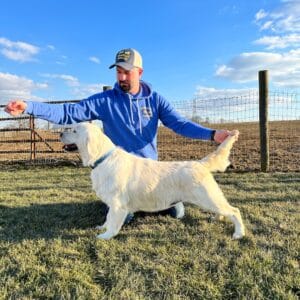Last weekend at our local dog park, I watched a scene that perfectly captures the challenge of finding the right family dog. Their energetic young Border Collie was dragging around a sweet elderly couple, while nearby, a family with three young kids had a patient Golden Retriever who seemed to know how to interact with each child instinctively.
The contrast was striking, and I wondered how many families struggle with mismatched dogs.
I’ve been helping families find their perfect canine companions for years and have seen beautiful matches and heartbreaking mismatches. Choosing the right dog isn’t about picking the cutest puppy or going with whatever breed is trending on social media.
It’s about honest self-reflection and finding a breed that genuinely fits your real life. Let me share what I’ve learned about making this critical decision.
The Questions You Need to Answer First
Before falling in love with any particular breed, sit down with your family and be brutally honest about your situation. I know it’s not the fun part, but trust me, it’s the most important part.
Think about your kids first. A rambunctious puppy might overwhelm a quiet three-year-old, while a low-energy breed could bore an active teenager. I’ve seen families choose high-energy breeds thinking it would be “good for the kids,” only to realize they’ve added a furry tornado to an already chaotic household.
Your living situation matters more than you might think. Yes, big dogs can live in apartments, but it requires a serious commitment to exercise and mental stimulation. And please, be realistic about your future, if you’re planning to move, have more kids, or change jobs, factor that into your decision.
Here’s where most families get it wrong: they overestimate their activity level. You might love the idea of daily hikes with your dog, but if your current idea of exercise is walking to the mailbox, don’t choose a breed that needs two hours of daily activity. Be honest about what you’ll do, not what you think you should do.
If you’ve never had a dog before, that’s okay! But it means you need a forgiving breed that won’t take advantage of beginner mistakes. Some dogs are natural teachers; others need confident, experienced handlers from day one.
And let’s talk about time. Grooming, training, and daily care all take time. A Poodle might seem perfect until you realize you’re looking at $100 grooming bills every six weeks forever.
What Matters in a Family Dog
After placing hundreds of dogs with families, I can tell you that specific characteristics make or break the relationship.
Temperament is everything. You need a dog whose personality is predictable and stable. Dogs with erratic temperaments stress everyone, especially children who can’t read subtle warning signs.
Size isn’t just about space; it’s about daily life. Can you physically manage your dog if needed? Will they accidentally knock over your toddler during regular play?
A 20-pound dog and a 70-pound dog impact your family completely differently.
Energy levels have to match your reality, not your aspirations. High-energy dogs don’t just need long walks, they need mental stimulation, training, and often a job. Moderate-energy dogs adapt to your lifestyle, whether active weekends or quiet evenings at home.
Trainability isn’t just about teaching tricks – it’s about living peacefully together. Dogs that learn quickly and want to please make family life smoother. Stubborn breeds can turn daily life into a constant battle of wills.
Health matters more than people realize. Some breeds have predictable, expensive health problems, while others are generally healthy but have shorter lifespans. Factor in the emotional and financial costs of potential health issues.
Let’s Be Honest About Popular Breeds
I hate to break it to people, but many popular “family dogs” aren’t great for most families.
Labs are terrific, but young Labs are furry hurricanes. Most don’t settle down until they’re three or four years old. That’s a long time to manage a 70-pound puppy who thinks everything is a toy.
German Shepherds are loyal, intelligent, and serious dogs that need experienced handling. If not properly channeled, their protective instincts can become problematic, especially around children’s friends.
Poodles are brilliant and don’t shed, but that gorgeous coat requires professional grooming every six weeks and daily brushing at home. Their intelligence can also manifest as stubbornness if they’re not consistently challenged.
Border Collies are incredibly smart but working dogs that need jobs. Without sufficient mental and physical stimulation, they often develop behavioral problems that make them unsuitable for typical family life.
Even American Golden Retrievers, while wonderful dogs, often have more energy and take longer to mature than many families expect. Their enthusiasm can lead to jumping and mouthy behavior that requires consistent management.
I’m not saying these breeds can’t work; they can with the right families. However, they often require more specialized care than the average family anticipates.
Why European Golden Retrievers Keep Winning
In all my years of matching families with dogs, European Golden Retrievers consistently come out on top. Here’s why they work so well for so many families.
Their temperament is just different. European breeding programs have maintained the calm, balanced personality that makes these dogs naturally suited for family life. They’re friendly without being overwhelming, confident without being pushy.
They’re the perfect size for most families, substantial enough to handle kids’ enthusiasm but not so big that they dominate your living space. I’ve watched European Goldens instinctively adjust their energy level when playing with a three-year-old rather than a ten-year-old.
Their energy level is beautifully balanced. They’ll happily join family activities but are equally content with moderate exercise. They don’t demand constant stimulation like some breeds, but they’re not couch potatoes.
What sets them apart is their trainability. European Goldens genuinely want to please their families. They learn quickly and retain what they’ve learned. Even first-time dog owners usually succeed with these dogs.
The health advantages are significant too. Responsible European breeding emphasizes health testing and genetic screening, resulting in dogs with fewer problems and longer lives. That means less heartbreak and lower vet bills for families.
Their grooming needs are manageable, regular brushing handles the shedding, and while they do shed, it’s predictable and manageable. No professional grooming is required, and no special diets are required to prevent skin problems.
But what really makes them special is how they interact with children. They seem to instinctively understand how to interact with kids of different ages: patient with toddlers, playful with school-age kids, gentle with babies.
Making Your Decision
I tell every family that the wrong dog choice affects your entire family for 10-15 years. It’s expensive, emotionally draining, and often results in dogs being rehomed.
When you talk to breeders, good ones will ask you lots of questions about your lifestyle and expectations. They should want to understand your family situation, not just make a sale. If someone constantly has puppies available or pressures you to decide quickly, walk away.
At Rockvale, we get to know each family because we want these relationships to succeed. We’ve learned that European Golden Retrievers work beautifully for such a wide range of families, from first-time dog owners to experienced handlers, from families with babies to those with teenagers.
The difference between a good match and a great match often comes down to understanding individual puppy personalities within the breed. We evaluate each puppy’s temperament and match them with families based on specific needs and lifestyles.
If you’re considering adding a dog to your family, I’d love to discuss whether a European Golden Retriever might be the right fit. We’ll be honest about whether it’s a good match, because the goal isn’t just to place puppies, it’s to create lifelong family relationships that bring joy for years to come.
Contact us to discuss your family’s specific situation. Let’s ensure your next family member is perfect for your particular family.




